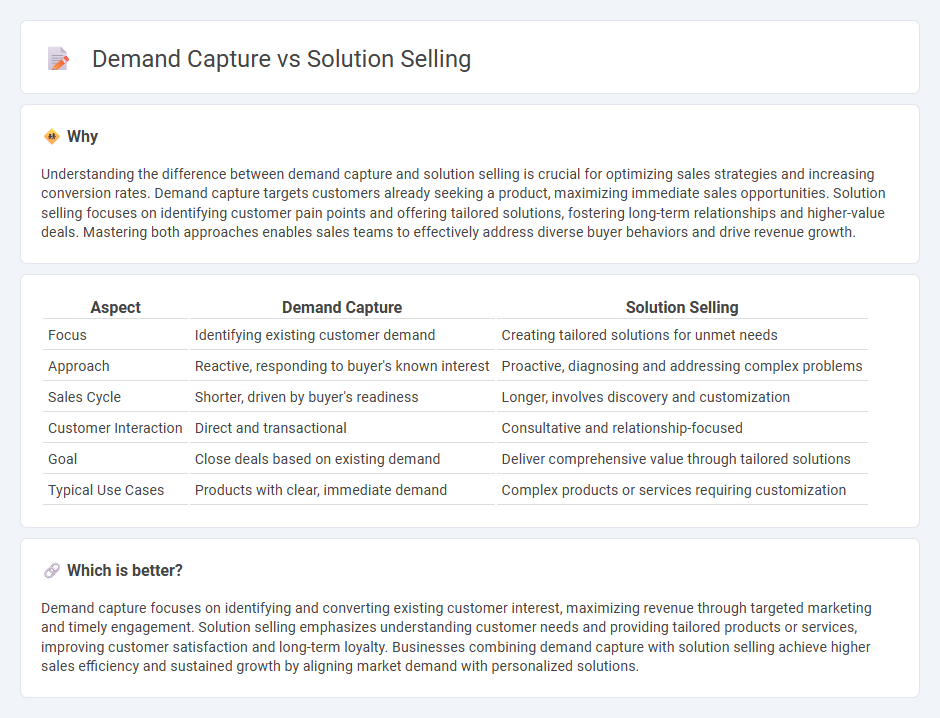
Demand capture focuses on identifying and responding to existing customer needs through targeted marketing and sales efforts, aiming to convert active buyers quickly. Solution selling emphasizes understanding the customer's broader challenges and tailoring offerings to deliver comprehensive value beyond the product itself. Explore the nuances between these sales strategies to enhance your revenue growth.
Why it is important
Understanding the difference between demand capture and solution selling is crucial for optimizing sales strategies and increasing conversion rates. Demand capture targets customers already seeking a product, maximizing immediate sales opportunities. Solution selling focuses on identifying customer pain points and offering tailored solutions, fostering long-term relationships and higher-value deals. Mastering both approaches enables sales teams to effectively address diverse buyer behaviors and drive revenue growth.
Comparison Table
| Aspect | Demand Capture | Solution Selling |
|---|---|---|
| Focus | Identifying existing customer demand | Creating tailored solutions for unmet needs |
| Approach | Reactive, responding to buyer's known interest | Proactive, diagnosing and addressing complex problems |
| Sales Cycle | Shorter, driven by buyer's readiness | Longer, involves discovery and customization |
| Customer Interaction | Direct and transactional | Consultative and relationship-focused |
| Goal | Close deals based on existing demand | Deliver comprehensive value through tailored solutions |
| Typical Use Cases | Products with clear, immediate demand | Complex products or services requiring customization |
Which is better?
Demand capture focuses on identifying and converting existing customer interest, maximizing revenue through targeted marketing and timely engagement. Solution selling emphasizes understanding customer needs and providing tailored products or services, improving customer satisfaction and long-term loyalty. Businesses combining demand capture with solution selling achieve higher sales efficiency and sustained growth by aligning market demand with personalized solutions.
Connection
Demand capture focuses on identifying and engaging potential customers actively seeking solutions, while solution selling emphasizes tailoring offerings to address specific customer needs. Both strategies work synergistically by converting demand signals into personalized sales engagements, boosting conversion rates and customer satisfaction. Integrating demand capture insights enhances solution selling effectiveness by aligning products with real-time market needs.
Key Terms
**Solution Selling:**
Solution selling emphasizes understanding customer pain points to tailor products that address specific needs, driving higher value and long-term relationships. Sales teams engage consultatively, leveraging insights and customization to differentiate offerings from competitors. Explore more strategies to enhance your sales effectiveness through solution selling.
Consultative Approach
Solution selling emphasizes a consultative approach by identifying customer needs and tailoring products to solve specific problems, enhancing value through personalized engagement. Demand capture centers on responding to existing market demand, leveraging data-driven insights to optimize sales strategies and capitalize on current buying intent. Explore how integrating consultative techniques with demand capture can transform your sales process and boost revenue.
Needs Assessment
Solution selling emphasizes a thorough needs assessment by identifying the customer's pain points and aligning product benefits to address those specific challenges, facilitating a tailored solution. Demand capture centers on recognizing existing market demand and responding promptly with relevant offerings, often relying on demand signals rather than deep analysis. Explore further to understand how mastering needs assessment enhances both strategies' effectiveness in closing deals.
Source and External Links
Solution Selling vs. Consultative Selling: Key Differences - Qwilr - Solution selling is a sales approach focused on identifying a client's specific problems and offering tailored solutions, often used for complex technical problems, industry-specific needs, or new product launches.
Solution Selling: What It Is & How to Do It Effectively - HubSpot Blog - Solution selling involves a 6-step process starting from prospecting clients with specific problems to closing deals by presenting customized solutions showing clear ROI.
What is Solution Selling? | DealHub - Solution selling is a customer-centric sales methodology that replaces traditional product selling by deeply understanding customers' needs and crafting customized solutions to help them succeed long-term.
 dowidth.com
dowidth.com